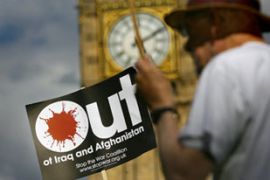UK sends more troops to Afghanistan
Britain increasing number of soldiers in Afghanistan to 8,000, prime minister says.

“We have resolved … it is in the British national interest to confront the Taliban in Afghanistan, or Afghanistan would come to us,” Brown said at the conference.
“Eighteen months ago, the Taliban boasted that they and their paid foreign fighters would drive our forces out of southern Helmand.
“Now, most agree that security is on the way to being transformed.”
Military deaths
Des Browne, Britain‘s defence secretary, was to make a full statement in parliament later on Monday.
Britain has approximately 7,800 soldiers in Afghanistan, most of whom are in Helmand fighting the Taliban, who have been fighting since being removed from power in the 2001 US-led invasion of the country.
Iran standoff
On Iran, Brown said: “Today, Britain will urge Europe, and Europe will agree to take further sanctions against Iran.
“We will take action today that will freeze the overseas assets of the biggest bank in Iran, the Melli bank, and secondly action will start today for a new phase of sanctions on oil and gas,” he said at the conference, apparently referring to EU ministerial talks taking place in Luxembourg.
 |
| Brown, left, vowed to increase UK troop levels in Afghanistan to their highest so far [AFP] |
He noted that Javier Solana, the EU foreign policy chief, had had a latest round of talks with Iran over the weekend.
“We await the Iranian response and will do everything possible to maintain the dialogue,” he said.
“We will take any necessary action so that Iran is aware of the choice it has to make to start to play its part as a full and respected member of the international community or face further isolation.”
Bush warned that he had not ruled out the use of force to end Iran‘s nuclear work, but said that he hoped to end the crisis diplomatically.
“Now’s the time to work together to get it done,” Bush said
“All options are on the table, however.”
Anti-war protests
Bush’s current visit to Britain, part of a “farewell” tour of Europe, was marred by anti-Iraq war protests.
Security was tight with London’s Metropolitan Police saying they had deployed about 1,200 officers to secure the president’s 24-hour visit to Britain.
Up to 2,500 demonstrators took to the streets to oppose the visit.
The rally in London’s Parliament Square on Sunday was held 300m from Downing Street where Bush was dining with Brown.
Protesters called Bush a “terrorist” and voiced their opposition to the so-called “war on terror”.
Twenty-five people were arrested after violence broke out between police and demonstrators who pelted officers with placards as they tried to breach a police cordon set up near the prime minister’s Downing Street residence.
Police officers were seen beating protesters with batons.